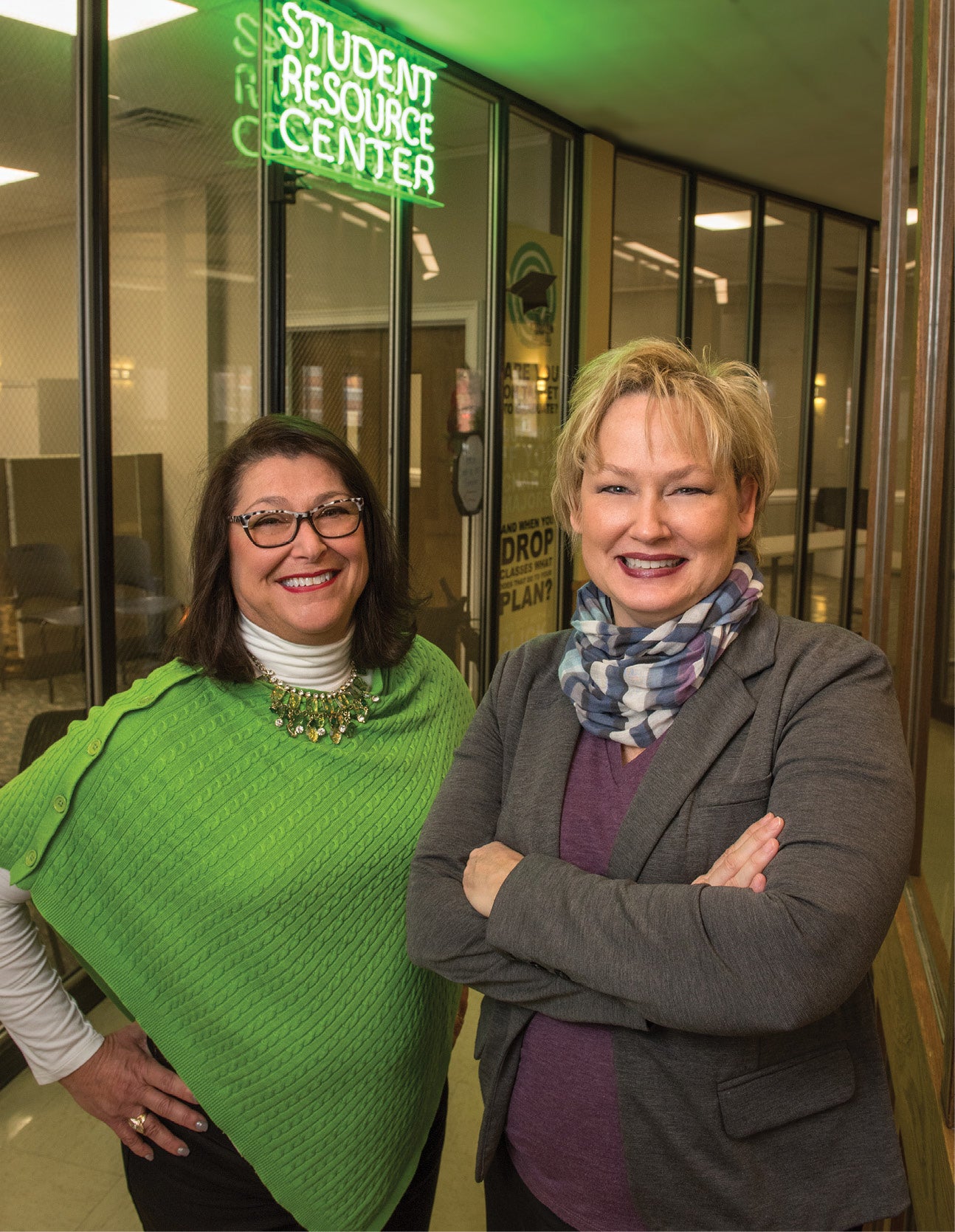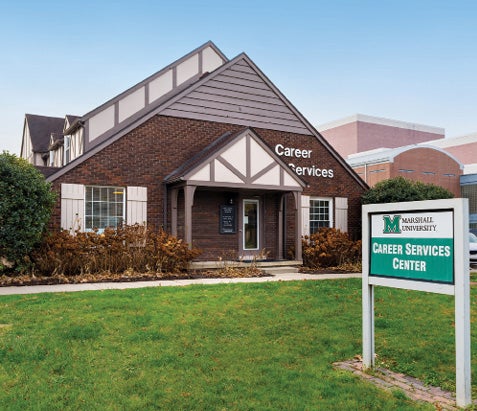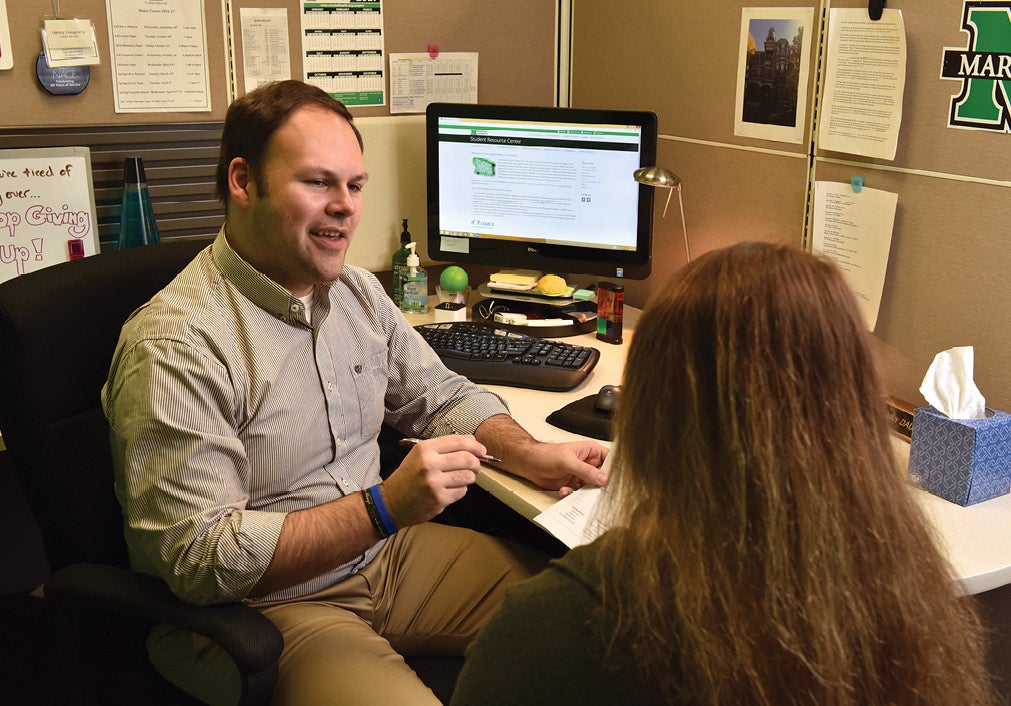
The Office of Career Services and the Student Resource Center join forces to create the Office of Career Education.
Marshall University is committed to the success of its students — from the day they arrive on campus until after they have graduated and entered the workforce. The recent merger of the Office of Career Services and the Student Resource Center to form the Office of Career Education assists students in realizing their own intellectual flexibility early enough in college to make a difference in their academic success now and their professional success later.
Merging academic planning with career education helps students see the multiple paths they can take, which will lead them to a career they want. For example, a student who struggles with the chemistry requirements for a biology degree could combine a communications major with a minor in biology and discover a broad range of professional opportunities, including popular science writing, health care consulting or public relations for an endangered species research center.
“What students often don’t see is that one major can lead to many different careers, and many different majors can lead to a single career,” said Dr. Sherri Smith, associate vice president for academic affairs and dean of undergraduate studies. “Once you start to bring together academic and career planning and say ‘there are doors opening for you rather than a door closing,’ it transforms the student’s perspective.”
The Student Resource Center originally was designed to help students find all the information they need in one location, rather than going from office to office. In addition, the SRC staff advised undecided students, who are usually freshmen and sophomores. Career Services provided a range of services, from career exploration to resume development, used most by juniors and seniors preparing to transition from college to the workplace. The idea of combining the two offices arose from institutional efforts to improve student retention and degree completion rates.
Smith said they also discovered that students who were “pre-majors” had lower-than-desired retention rates. These students meet the academic qualifications to be admitted to Marshall, but not the admissions requirements for the program in which they want to major. Without intervention, too many of these students become stuck, taking classes in hopes of being admitted to their program but not making progress toward their degree.
“We recognized that we need to provide a different kind of educational experience to these students that helps them look beyond their intended major. Merging the SRC and Career Services to become the Office of Career Education helps us do that,” said Smith. “Many students are not thinking about the connection between their academic work and what they will do after they graduate. We conjectured that, if we could get them to think that way, we might be able to help more of these students graduate.”
 Career Education consultants have several assessment tools they use to help students reflect on their aptitudes, interests, values and beliefs. After completing these assessments, students have a guided discussion with staff about how the results can inform their major and career choices.
Career Education consultants have several assessment tools they use to help students reflect on their aptitudes, interests, values and beliefs. After completing these assessments, students have a guided discussion with staff about how the results can inform their major and career choices.
“We are not here to change anyone’s mind,” Denise Hogsett, director of career education, said. “We are in the business of doing what is best for the student, helping them think about where they see themselves and how they can get there. If, after self-reflection, they see that they cannot get there, then we can help guide them toward a change.”
Rather than waiting for students to seek out their services, the new Office of Career Education will embed learning about careers in the academic curriculum during the first two years of college. Freshmen will participate in a new program called First-Year Discovery, which helps them understand how major clusters and career clusters relate to one another. Only after students begin to thrive in a best-fit major will they participate in Sophomore Focus, to learn more about the expectations of an associated career cluster.
“When students feel like they have made a good decision about their major, it is like the weight of the world is lifted off their shoulders. Then they see a purpose for what they are doing and can get the most out of their time at Marshall,” said Hogsett.
 Job shadowing is an important part of both First-Year Discovery and Sophomore Focus. Hogsett said sometimes students have an idea of what they think it will be like to work in a particular industry, but the reality does not match their expectations. Finding that out early through experiences like job shadowing prevents freshmen from pursuing a major that does not lead to a desirable career.
Job shadowing is an important part of both First-Year Discovery and Sophomore Focus. Hogsett said sometimes students have an idea of what they think it will be like to work in a particular industry, but the reality does not match their expectations. Finding that out early through experiences like job shadowing prevents freshmen from pursuing a major that does not lead to a desirable career.
On the other hand, job shadowing at the sophomore level “helps students augment their education by engaging in co-curricular experiences that prepare professionals to be adaptive problem-solvers,” Smith said. With a better understanding of what is expected in a particular career path, students work with Career Education staff to develop a plan to seek out those experiences while in college. For example, a student who shadows a lawyer may then decide to join the speech and debate team. The process results in students who have found a career path that is right for them and who not only have a degree but also have had experiences to prepare them for that career and make them stand out on the job market.
The Office of Career Education is reaching out to local employers and alumni who would be willing to host students for a day of job shadowing. Providing those experiences is an important way alumni and the community can support Marshall’s academic mission.
“Career education enables students to avoid the some-college, lots-of-debt, no-degree trap,” Smith said. “Today one can use virtually any degree to pursue virtually any career, but many students don’t understand this. A rich curriculum in career education helps students see how all the pieces of the collegiate experience connect to one another. We now see career education at the center of student success.”
Molly McClennen is a freelance writer who divides her time between Huntington and Chicago, where she attends graduate school at the University of Illinois.
Photos: (Above) Dr. Sherri Smith (right), associate vice president for academic affairs and dean of undergraduate studies, and Denise Hogsett, director of career education, worked to create the new Office of Career Education. (Center) The Office of Career Services offered guidance and assistance to students preparing to enter the workforce. (Below) Denny Daugherty (left), major exploration consultant in the SRC, uses assessment tools and guided discussions to help students determine their major and vocational options.